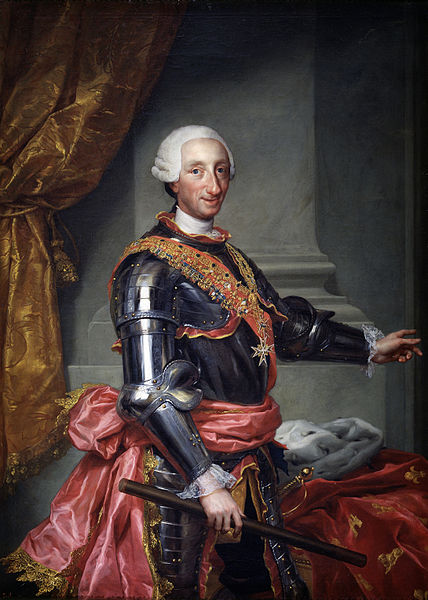- Joined
- Aug 13, 2004
- Messages
- 27,104
- City
- São Paulo
- Country
- Brazil
Carlos III Sebastiano, King of Spain, Napels and Sicily, Duke of Parma (Madrid, 20 January 1716 - Madrid, 14 December 1788); married by proxy in Dresden on 9 May 1738 and in person in Gaeta on 19 June 1738 Princess Maria Amalia of Saxony (Dresden, 24 November 1724 - Buen Retiro, 27 September 1760)
Reign: 1759 - 1788
Dynasty: Bourbon
Predecessor: King Fernando VI of Spain
Succeeded by: King Carlos IV of Spain
Children: Princess Maria Isabel, Princess Maria Josefa, Princess Maria Isabel and Princess Maria Josefa of Spain, Empress Maria Luisa of Austria, Prince Felipe of Spain, Duke of Calabria; King Carlos IV of Spain; Princess Maria Teresa and Princess Maria Ana of Spain, King Fernando IV of the Two Sicilies; Prince Gabriel, Prince Antonio and Prince Francisco of Spain
Parents Carlos: King Felipe V of Spain and Princess Elisabeth of Parma
Parents Maria Amalia: King Augustus III of Poland, Elector of Saxony and Archduchess Maria Josepha of Austria
Siblings Carlos: King Luis I of Spain, Prince Felipe Luis and Prince Felipe Pedro of Spain, King Fernando VI of Spain, Prince Francisco of Spain, Queen Maria Ana of Portugal, Duke Filippo of Parma, Crownprincess Maria Teresa of France, Prince Luis of Spain, Archbisshop of Toledo and Primate of Spain, Count of Chinchon and Queen Maria Anonietta of Sardinia
Siblings Maria Amalia: Prince Friedrich-August, Prince Joseph, Elector Friedrich-Christian and Princess Maria Margaretha of Saxony; Electress Maria Amalia of Bavaria, Prince Franz Xavier of Saxony, Crownprincess Maria Josepha of France, Pricne Karl Christian of Saxony, Duke of Courland; Princess Maria Christina and Princess Maria Elisabeth of Saxony; Prince Albrecht Casimir of Saxony, Duke of Teschen; Prince Clemens of Saxony, Archbisshop of Trier; Princess Maria Alegonda of Saxony
Reign: 1759 - 1788
Dynasty: Bourbon
Predecessor: King Fernando VI of Spain
Succeeded by: King Carlos IV of Spain
Children: Princess Maria Isabel, Princess Maria Josefa, Princess Maria Isabel and Princess Maria Josefa of Spain, Empress Maria Luisa of Austria, Prince Felipe of Spain, Duke of Calabria; King Carlos IV of Spain; Princess Maria Teresa and Princess Maria Ana of Spain, King Fernando IV of the Two Sicilies; Prince Gabriel, Prince Antonio and Prince Francisco of Spain
Parents Carlos: King Felipe V of Spain and Princess Elisabeth of Parma
Parents Maria Amalia: King Augustus III of Poland, Elector of Saxony and Archduchess Maria Josepha of Austria
Siblings Carlos: King Luis I of Spain, Prince Felipe Luis and Prince Felipe Pedro of Spain, King Fernando VI of Spain, Prince Francisco of Spain, Queen Maria Ana of Portugal, Duke Filippo of Parma, Crownprincess Maria Teresa of France, Prince Luis of Spain, Archbisshop of Toledo and Primate of Spain, Count of Chinchon and Queen Maria Anonietta of Sardinia
Siblings Maria Amalia: Prince Friedrich-August, Prince Joseph, Elector Friedrich-Christian and Princess Maria Margaretha of Saxony; Electress Maria Amalia of Bavaria, Prince Franz Xavier of Saxony, Crownprincess Maria Josepha of France, Pricne Karl Christian of Saxony, Duke of Courland; Princess Maria Christina and Princess Maria Elisabeth of Saxony; Prince Albrecht Casimir of Saxony, Duke of Teschen; Prince Clemens of Saxony, Archbisshop of Trier; Princess Maria Alegonda of Saxony
Last edited:


